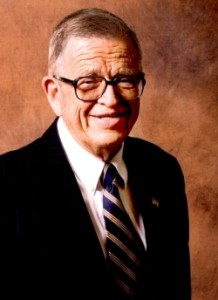Civility and Chuck Colson
 Yesterday, Mary DeMuth wrote a loving tribute to her friend and mentor Charles W. “Chuck” Colson. Many people in my generation remember Colson as a Special Counsel to President Richard M. Nixon; as a man who pled guilty to obstruction of justice and then went to prison for his role in Watergate.
Yesterday, Mary DeMuth wrote a loving tribute to her friend and mentor Charles W. “Chuck” Colson. Many people in my generation remember Colson as a Special Counsel to President Richard M. Nixon; as a man who pled guilty to obstruction of justice and then went to prison for his role in Watergate.
Few of us know the Colson about whom DeMuth writes; the man who converted to Christianity in 1973 and has spent the past 39 years doing his best to live his Christian faith; the man who has voluntarily spent the past 30+ Easters in prison doing prison ministry. Sadly, Colson was not in prison for Easter 2012 because he lay in critical condition in a hospital bed recovering from surgery for an intracerebral hemorrhage.
Regardless of what we might think of Colson’s past politics or current theology, we should have compassion for a man who is in ill health. Yet, in “People Will Hate You if You Love Jesus,” Demuth cites some vicious comments made at the end of a CNN article about Colson’s medical condition:
- From “Satan” Hey Chuck! Drop on by whenever you are ready. I’ve got the jaws of hell wide open for you.
- From Howlyn: Chuck Colson: you are a corrupt piece of garbage.
- From Camel: When he dies, I wonder if the very rich Colson will have to try to pass through the eye of a needle before the let him in heaven.
- From Charles: What a crappy article about a rancid sack of garbage no one cares about. Too bad the surgery worked.
- From J.W.: He has ugly lips.
Unfortunately, because the lack of civility in contemporary American society is so appalling, Demuth could just have easily titled her article “People Will Hate You if You Simply Disagree with Them.” Fortunately, lessons concerning civility are easily incorporated into our classrooms.
The day before DeMuth wrote her tribute to Colson and made her comments about incivility, I taught “The Meaning of Truth,” a lecture by Colson in which he presents four criteria for determining “Truth.” Because he uses the type of Biblical references we should expect from him as he addresses a Christian audience, some students object to his presentation.
When we discuss the video, I do not permit ad hominem attacks against Colson and insist that he is given the respect to which any serious scholar is entitled. If, for example, students believe that Colson’s position on homosexuality—a topic on which he expounds during his lecture—is wrong; I challenge them to explain how they know their beliefs about homosexuality are true. Often, I catch students taking the same type of myopic approach to their arguments that they accuse Colson of making. I then challenge them on their blind faith and narrow points of view.
Because Colson is so confident in his beliefs and articulates his arguments so well, I find that using his materials to be very helpful in my attempts to transform students into critical thinkers . However, I am no fan of Colson. When I teach a follow-up lecture he gives in the same series in which “What is Truth?” is found, I am very critical of his poor understanding of Eastern thought and the way he presents1 certain non-Christian theologies. Yet, as I challenge his examples, I remain civil and respectful; something that I believe we are all called to do.
Modeling civility in our classrooms, in our interactions with students and colleagues, and in our personal lives, we do more to promote a civil society than we do when we denigrate someone with whom we disagree—even if that someone is consigning us to Hell. I take no joy in Chuck Colson’s medical problems and my heart goes out to him, to his family, and to the people whom he has encouraged to be better human beings.
–Steven L. Berg, PhD
1At approximately 10:30am on April 14, I changed “misrepresents” to “presents.” My original word choice implies that I believe that Mr. Colson is being deceitful; something I do not believe. Instead, I believe that his error is a result of misunderstanding and that there is no ill intent on his part. I realized my error when I received a note from Dr. Gelnn S. Sunshine which read, in part, “In terms of his understanding of Eastern religion, he is still learning–another thing I appreciate about him. He’s considered by many to be an expert on a lot of different things, including worldview, yet he knows his limits and asks for corrections in his thinking and incorporates them into his presentations when he knows he’s on shaky ground. I don’t know many people at his level of influence who do that.”
[…] publishing “Civility and Chuck Colson,” I received a message from Dr. Glenn S. Sunshine concerning a section in which I was critical of […]